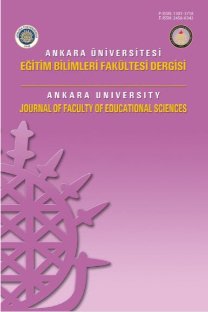Farklı standart belirleme yöntemlerinin geçme puanları üzerine etkisi
Bu araştırmada standart belirleme yöntemlerinin geçme puanları üzerine etkisi üzerinde çalışılmış, öğrencilerin geçti/kaldı durumlarının farklı standart belirleme yöntemlerine göre değişiklik gösterip göstermediği incelenmiştir. Araştırmanın kapsamında kullanılan öğrenci verileri, öğrencilerin biri sözel diğeri sayısal bir ders olmak üzere iki farklı dersten almış oldukları test puanlarıdır. Bu puanları elde etmek amacı ile 25’er maddeden oluşan Türkçe ve Matematik başarı testleri kullanılmıştır. Araştırmanın ikinci aşamasında gerekli olan veriler ise her bir yöntem için farklı hesaplanan ve farklı uzman görüşlerine dayanan puanlardır. Araştırma ile öğrenciler hakkında verilecek kararlar için kullanılabilecek Angoff Yöntemi, Nedelsky Yöntemi ve 1-0 (Yes/No) standart belirleme yöntemlerinden hangisinin seçileceği öğrenci grubuna, derse, kullanılacak testin yapısına ve öğretmenlere bağlı olarak değişebileceği görülmüştür.
Impact of standard setting methodologies over passing scores
In this study impact of standard setting methodologies over passing scores is studied and the changes on students’ pass/fail scores using different setting methodologies are researched. The data of the research in the first phase is collected from test results which are developed by researcher using 25 items per Turkish Language and Mathematics exams and applied to 129, 7th grade, Elementary School students. The data for second phase are collected by calculating cut points standing on different expert judgments per different methodology. It is seen by this study that the decision on standard setting methodologies for the students are related to students group, the structure of test methods and instructors.
___
- Angoff, W.H. (1971), Scales, Norms and Equivalent Scores, In R. L. Thorndike (Ed.) Educational Measurement, Washington, DC: American Council on Education
- Berk, R.A.; (1982), Criterion Referenced Measurement: The State of The Arts
- Chang, Lei. A.; (1996), Comparison Between The Nedelsky And Angoff Standart Setting Methods, Paper Presented At The Annual Meeting Of The National Council On Measurement In Education, New York
- Cizek, G.; Bunch M.; Koons H.; (2004), Setting Performance Standard: Contemporary Methods, Educational Measurement, Issues And Practice, Proquest Education Journals
- Chinn, R. N., & Hertz, N. R. (2002). Alternative approaches to standard setting for licensing and certification examinations. Applied Measurement in Education, Volume 15
- Ebel, R. L. (1972). Essential of Educational Measurement. Englewood Cliffs, New Jersey:Prentice- Hall, Inc.
- Eignor, D., Hambleton, R.K., (1979), Effects of Test Length and Advancement Score on Several Criterion-Referenced Test Reliability And Validity Indices. Laboratory of Psycometric And Evaluation Research Report No:86, Paper Presented at The Annual Meeting of The National Council on Measurement in Education, San Francisco.
- Horn,C.; Ramos,M; Blumer,I; Madaus,G.; (2000), Cut Scores: Results May Vary, Nbetpp Monograpps, Volume 1, Number 1
- Impara, J.C., Plake, B.S., (1998), Teachers Ability to Estimate Item Difficulty: A Test Of Assumptions in The Angoff Standart Setting Method, Journal of Educational Measurement, Volume35
- Jaeger, R. M. (1989) Certification of student competence. In R.L. Linn (Ed.) Educational Measurement (3rd ed.), Newyork
- Nedelsky, L. (1954) Absolute grading standards for objective tests. Educational and Psychological Measurement, Volume 14
- Turgut, M. Fuat. (1992), Eğitimde Ölçme ve Değerlendirme Metodları, Ankara, Saydam Matbaacılık.
- ISSN: 1301-3718
- Yayın Aralığı: Yılda 3 Sayı
- Başlangıç: 1968
- Yayıncı: ANKARA ÜNİVERSİTESİ (EĞİTİM BİLİMLERİ FAKÜLTESİ)
Sayıdaki Diğer Makaleler
Development of a Perception Scale on the Use of Webquests
Çevrimiçi Öğrenme Ortamında Algılanan Sosyalleşme Ölçeğinin Geçerlik ve Güvenirlik Çalışması
“Webquest” kullanımına ilişkin algı ölçeğinin geliştirilmesi
The Organizational Creativity Perceptions of Academic Staff
Farklı standart belirleme yöntemlerinin geçme puanları üzerine etkisi
Selahattin GELBAL, Sevda ÇETİN
Examining Teachers’ Self-Efficacy Beliefs of Students With and Without Specıal Needs
Vocational High School Female Students’ Opinions About Application Level of Skill Education
